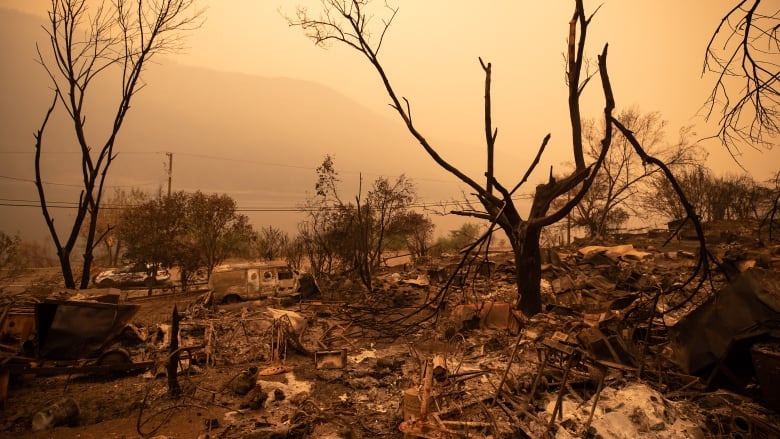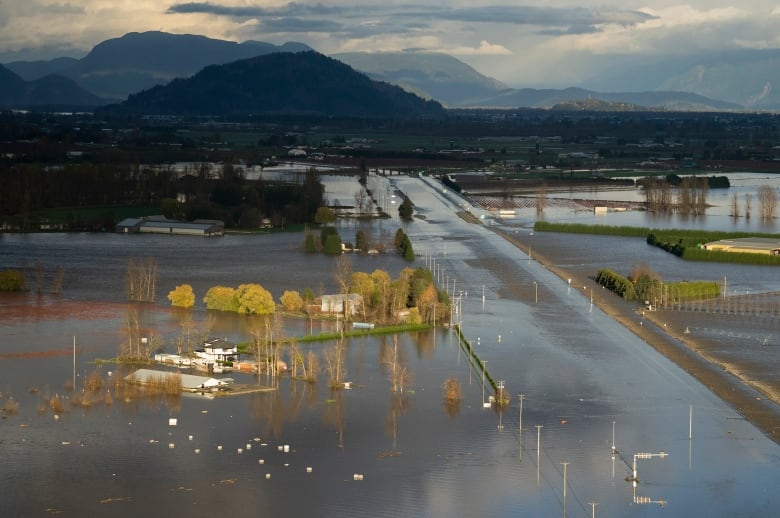B.C. says its climate plan is world leading. So why are emissions going in the wrong direction?
Experts warn B.C. climate targets are ambitious but unrealistic without steeply curbing fossil fuel emissions

Our planet is changing. So is our journalism. This story is part of a CBC News initiative entitledOur Changing Planetto show and explain the effects of climate change and what is being done about it.
As the Intergovernmental Panel on Climate Change (IPCC) released thethird and final section of its review of climate science, UNSecretary General Antonio Guterres said the report revealed "a litany of broken climate promises" by governments, accusing them of stoking global warming by failing to cut emissions.
And while British Columbiahas touted its own climate plan as among the best in the world, climate experts and environmental advocates point out that the province's emissions keep climbing in part due to ongoing investment in fossil fuels.
B.C's climate plan theCleanBC Roadmap to 2030released last October targetsgetting greenhouse gas emissions down to 40 per cent below 2007 levels by 2030, in part by increasingcarbon pollution prices, acceleratingtargets for zero-emission vehicle use and requiringindustry to come up with plans to meet their legislated emissions targets.
"Many climate experts say this is the leading climate plan in North America. I'm going to do my best to ensure we remain world leading, Canada leading," George Heyman, B.C.'s minister for environment and climate change, told CBC News on Monday following the release of the IPCC report.
But the province's emissions have increased every year since 2015 for which data is available, and have remained higher than 2007 levels.
Experts say a lack of detailed plan on how B.C. will cut its emissions in oil and gas and continued subsidies and investments in liquefied natural gas projects in the province's north are undercutting the progress made elsewhere, and risk putting the province's climate targets out of reach.

George Hoberg, a professor at UBC'sSchool of Public Policy and Global Affairs, said while the plan may be further reaching than those of some other provinces, it fails to provide a detailed accounting of how the most pollutingindustries can realistically bring their emissions down so fast.
"It's a fair statement in terms of the content of the policy and the aspirations embedded in those policies but not in terms of the direction of our emission or the guts of the policies themselves," Hoberg said about Heyman's "world leading" claim.
"For example, we promised to reduce oil and gas emissions in the province but we don't have a plan to do that yet."
Hobergsaid B.C.'s increase in emissions is, in part,a reflection of its growing population. And the provincehas outperformed in some areas of its plan, using hydro power to make the electrical grid virtually carbon free, and blowing past its targets to increase the number of electric vehicles on the road.
"Those things are quite admirable but that natural gas beast is lurking out there and needs to be addressed, especially post-2030, for B.C. to be able to make a good commitment to global climate actions," he said.
Once completed, the $40-billion LNG Canada projectwill see a pipeline carrying natural gas from Dawson Creek in northeastern B.C. to a new processing plant on the coast in Kitimat.
Heyman said the emissions associated with Phase 1of the LNG Canada plant are accounted for in the models laid out by the CleanBC plan. The province has said details on the program for reducing emissions from industries including oil and gas will be released in 2023.
"We'vemade it clear in our roadmap to 2030 that we're committed to a 33 to 38 per centreduction in emissions upstream and downstream in the oil and gas sector. That is part of our roadmap and we'll be judged on that," the minister said.
But the Sierra Club B.C., which is suing the province for failing to provide a detailed plan to achieve emissions targets, says the full emissions enabled by the LNG Canada terminal in Kitimat alone would make it nearly impossible to meet the province's targets.
"We had a few good years reducing emissions 10 years ago but then effortseased up," said Jens Wieting, a climate campaigner with the environmental group.
"The NDP restarted the process of the carbon tax, but both the previous Liberal government and the NDPgovernment have supported more fracking and building more LNGterminals, and that's a key part of the problem."
The NDP's CleanBC plan isthe latest iteration ofa climate change strategy handed down through successive B.C. Liberal and NDP governments since 2007 none of which met their emissions targets.
In 2007, theLiberal government of the timelegislated targets for slashing greenhouse gas emissions by a third by the year 2020, and by 80 per cent by 2050. The province didn't come close to meeting the first of those goals, andwhen it became clear that B.C. wasn't going to meet its 2020 target, the NDP government wrote it out of provincial climate change legislation.
The IPCC report authors warn that global emissions must be cut by 45 per centthis decade to avoid warming of 2.4 C to 3.5 C by the end of the century a level that would cause severe climate impacts for much of the world's population.
Many B.C. residents have already experienced some of theprojected catastrophic weather events much earlier than expected from catastrophic wildfires and flooding to last summer's deadly heat dome.
"It gives us a very daunting challenge," said Hoberg."Given the science, very few governments are doing enough compared to where we need to be."












_(720p).jpg)


 OFFICIAL HD MUSIC VIDEO.jpg)
.jpg)



























































































